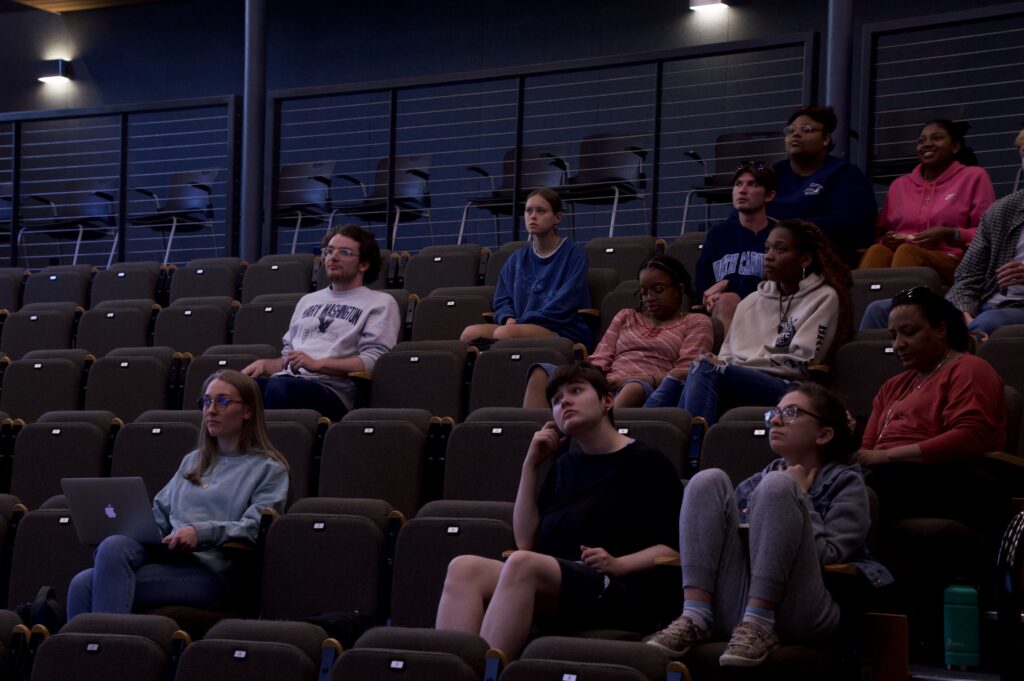Paino discusses potential tuition increase and university budget challenges during presentation
4 min read
Students watch University President Troy Paino as he presents at the SGA Budget and Fee Setting Forum. | Abbey Magnet, The Weekly Ringer
Samantha Bertsch
Staff Writer
On Feb. 7, students received an email stating that tuition and fees may increase anywhere from 0% to 5% in the upcoming year. This potential tuition raise has alarmed some students, spurring various events across campus that aim to provide students with a better understanding of the factors that contribute to the potential increase.
“UMW’s five-year annual growth rate for in-state undergraduate tuition is 1.5% from fiscal year 2018 to fiscal year 2023,” Executive Director of University Communications Amy Jessee said. She explained that this number pertains to the price of tuition and with the auxiliary fee, housing and dining included, the increase is actually 3.9%.
During a tuition forum hosted by the UMW Student Government Association on April 10, University President Troy Paino gave a brief presentation on the current operating budget of $140 million a year. In summary, UMW has two major sources of funding: 41% comes from students and 35% from the state. The money goes towards “education and general” expenses, which include paying faculty and administration as well as funding the library and “auxiliary” expenses, which includes housing, dining, the Talley Center, student clubs, athletics and other related fields.
Administration will be implementing budget cuts, aiming to lower the budget by $3 million. Thus far they have saved $1 million from retiring faculty, according to Paino.
“The biggest chunk of our budget is in personnel, and no we are not looking at layoffs, but we did do an early retirement incentive for faculty,” said Paino.
For the other $2 million, the administration is looking at job vacancies that could be closed and eliminated from the budget. “We try to avoid layoffs at all costs,” said Paino.
Some students expressed confusion about a potential tuition increase, as campus will soon be under construction, and UMW was just endowed $30 million from a late alumna.
“The university just received a large donation from an alum to the tune of 30 million USD,” said senior studio art major Olivia Breda. “To directly hike tuition after that feels disingenuous, and is something that will likely cause a detriment to the future of this school’s student body diversification.”
The $30 million donation was given specifically to provide research opportunities within science, technology, engineering and math fields.
Additionally, according to Paino, upcoming construction on Melchers, Dupont and Pollard Halls, as well as the construction of a new theatre building is fully funded by the state.
Concerning the budget, Paino explained that this year has been particularly difficult due to inflation. For example, the University leases spaces and within those agreements are built-in cost escalators.
“Last year, the General Assembly and the governor approved a two-year budget with a 5% increase for employees both from last year and for this year, so we had to cover a 5% pay raise for our employees last year and there’s another one slotted to begin July 1,” said Paino, who is in favor of the raise for employees, citing the rising cost of living in Fredericksburg.
This will increase costs by $3.3 million as it pertains to education and general expenses.
Another $2.1 million in the budget went to housing and admissions that were affected by COVID-19 and around $1 million that was taken out of the school’s reserve, which is the University’s savings account for disaster situations. With some state funding, this puts UMW at a $6.5 million deficit starting this upcoming fiscal year.
According to Paino, administration was expecting around $2.5 million in operating dollars if the General Assembly came together. Administration hopes to make up for the deficit with budget cuts, tuition fee increase and state funding.
“Unfortunately, if you have been following the news here in the commonwealth, they have not done that. There’s a big gap, big disagreement,” said Paino. “Governor Youngkin proposed tax cuts, reduction on the tax rate for the wealthiest category of taxpayers and corporate tax reduction, and that created about a billion dollar difference between the House budget and the Senate budget.”
Paino went on to explain that since the Senate is controlled by Democrats and the House is controlled by the Republicans, along with it being an election year, this has created a problem in funding higher education.
“We are kind of caught in the middle of that political reality here in Virginia right now,” he said.
Currently, UMW is in a holding pattern, and the budget will be built on the assumption the university will receive no additional funding from the state.
Some students are hopeful that the tuition will not be increased.
“College is already expensive, often prohibitively so. By increasing tuition, you’re locking many people out of higher education,” said senior studio art major Ella Schultz.
Senior English and studio art double major Emma Bower said, “They might think that we don’t know what we’re talking about but the more money they hike tuition, the smaller the freshman classes are going to get. Then where are we going to be?”
The Board of Visitors will hold off on deciding tuition and fee costs for a few weeks while waiting for the state to respond.
“If we get money from the state the first thing we are going to reduce, in terms of solution, is tuition and fees increase,” said Paino.


